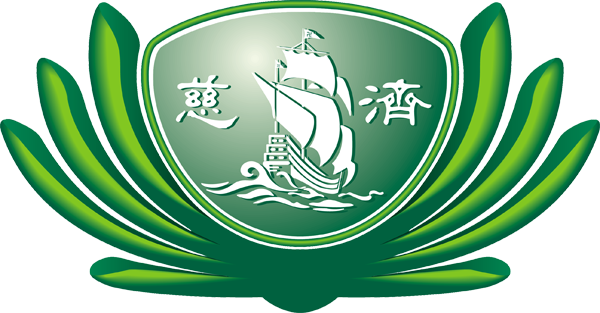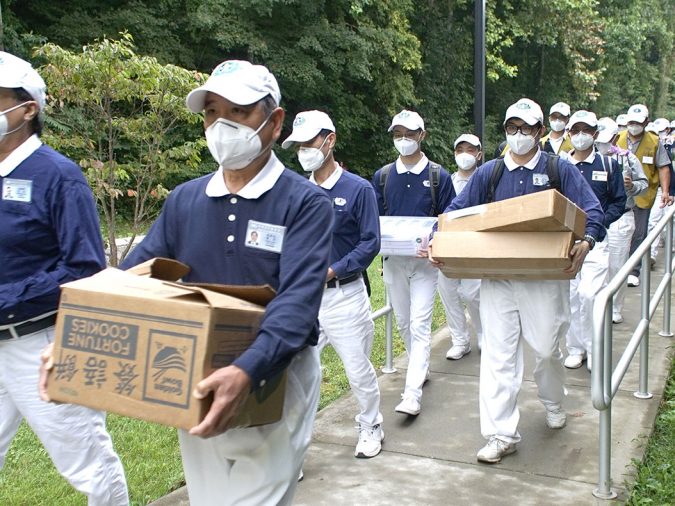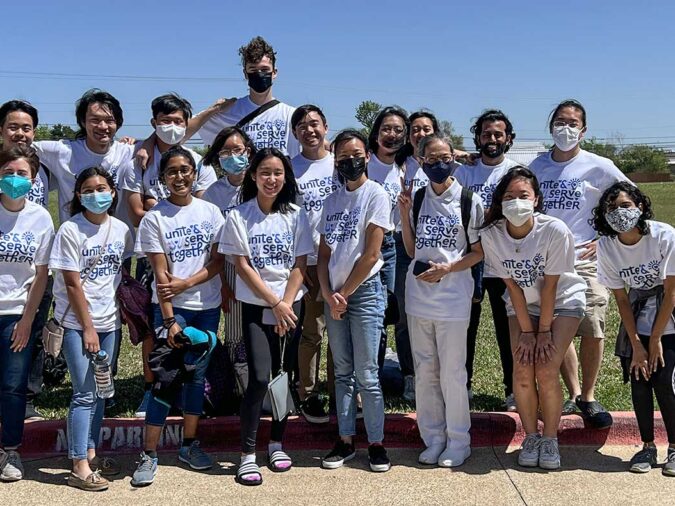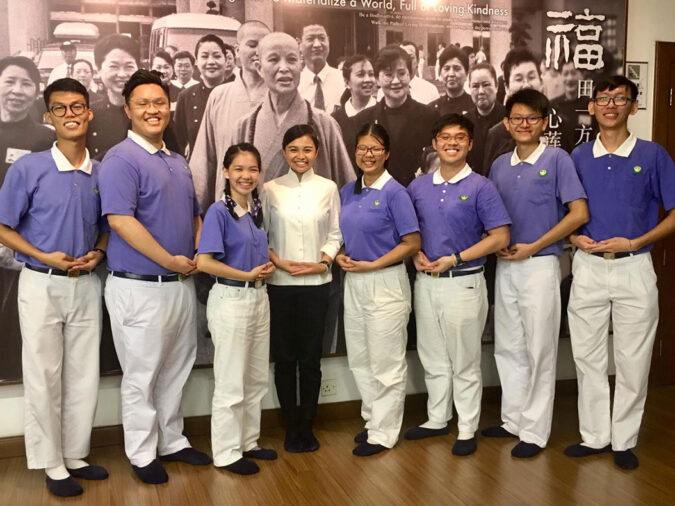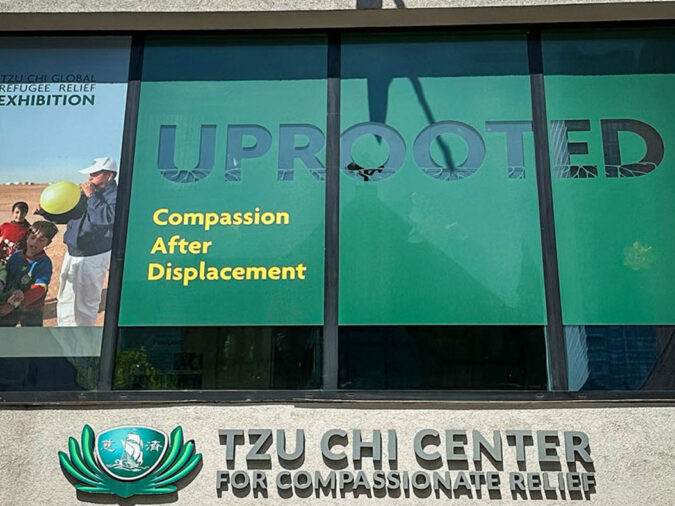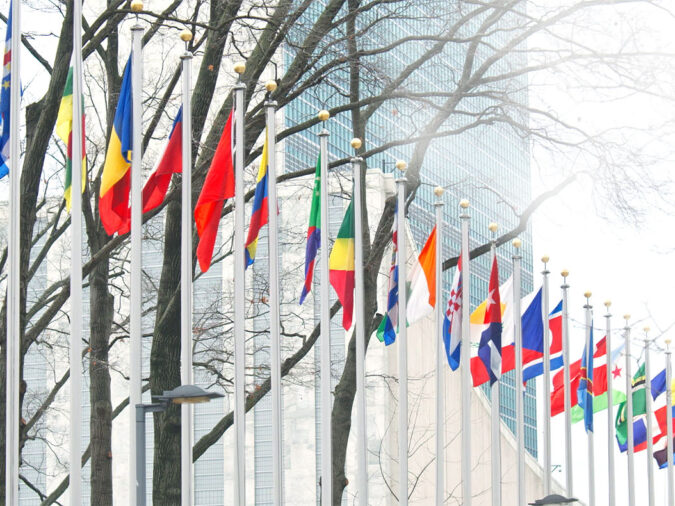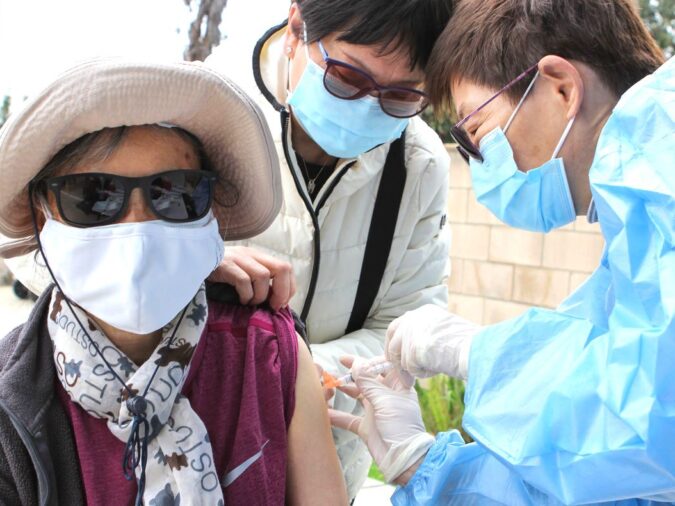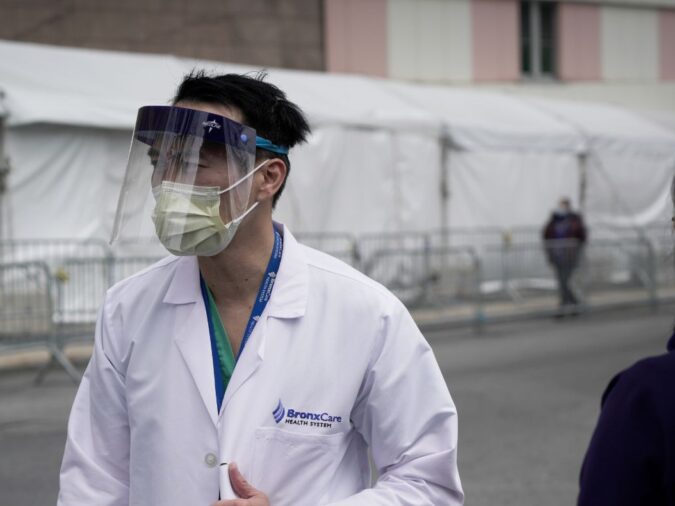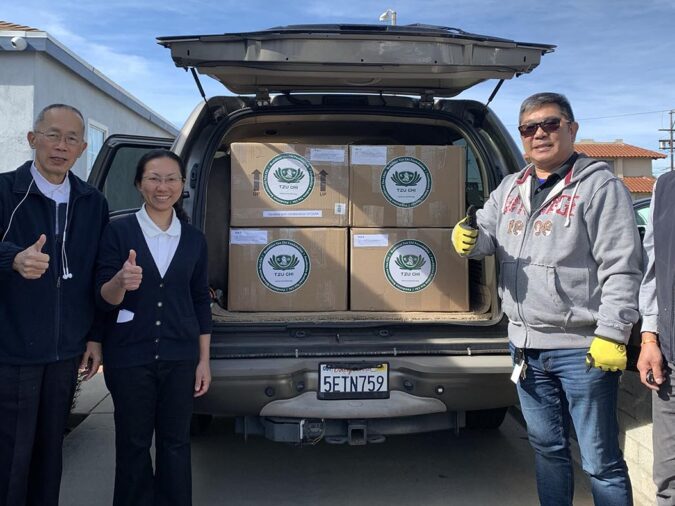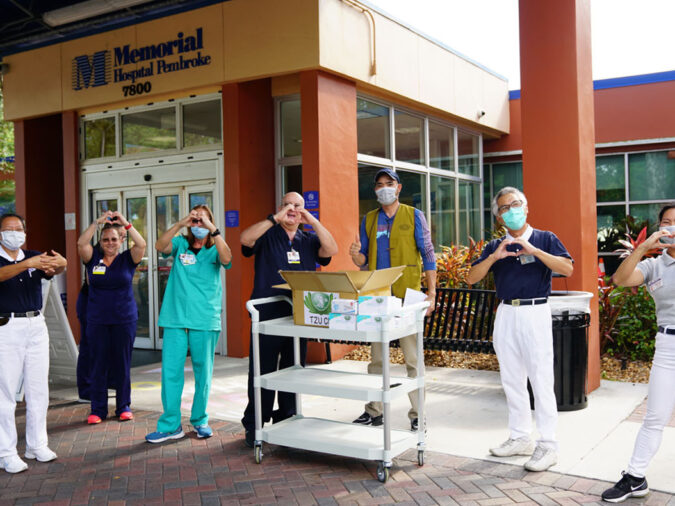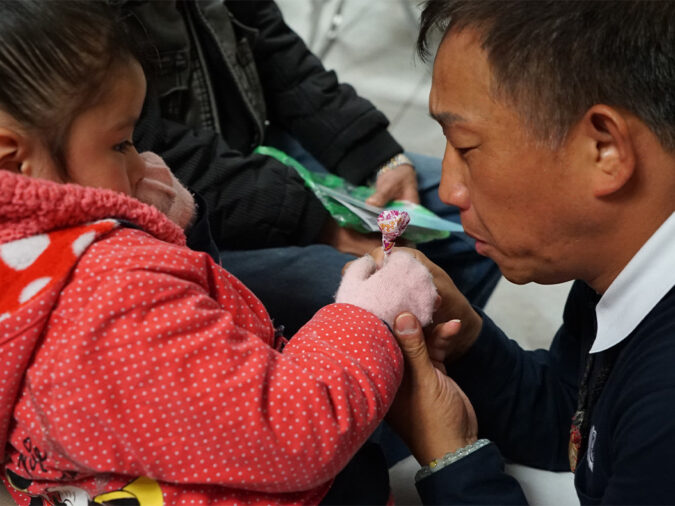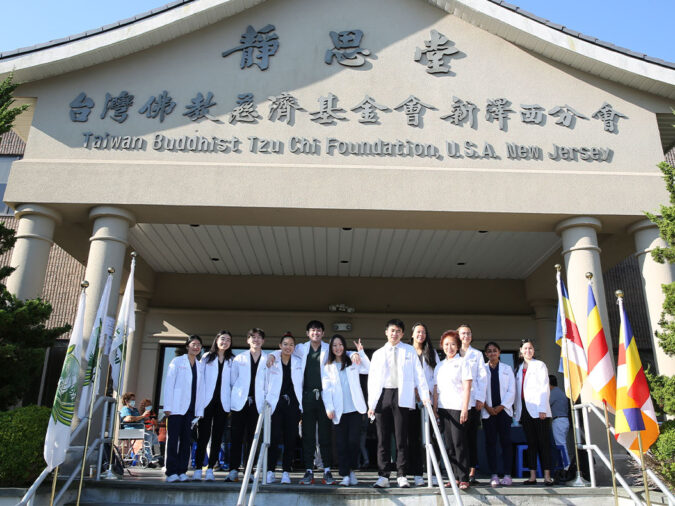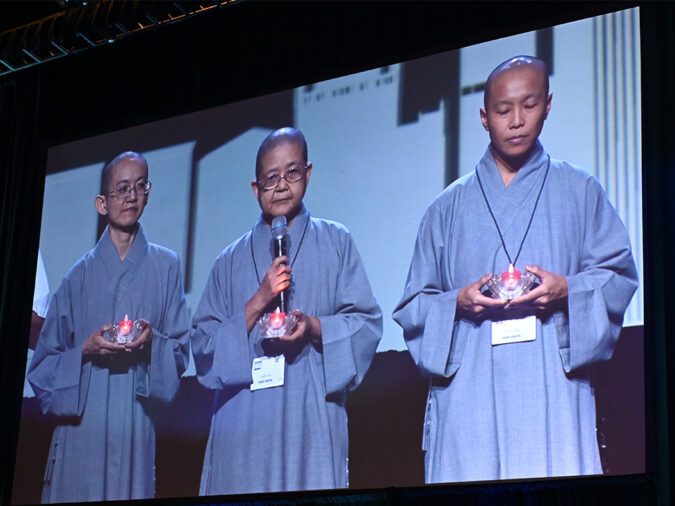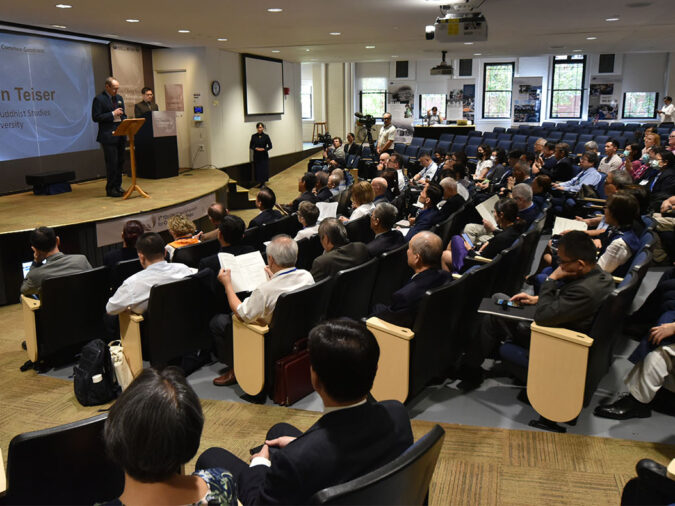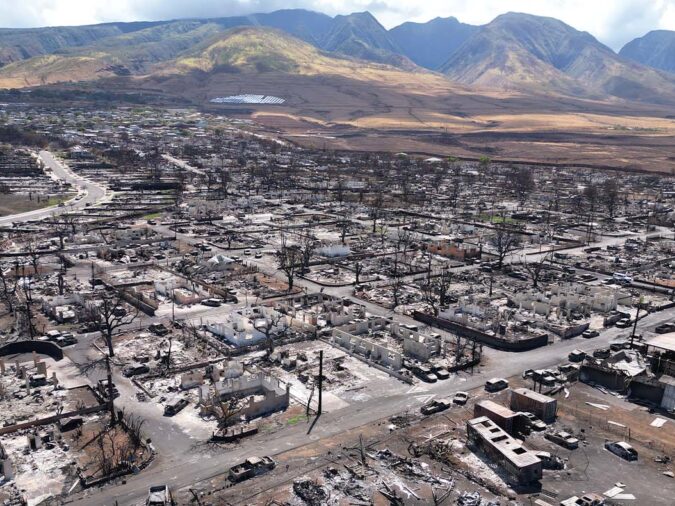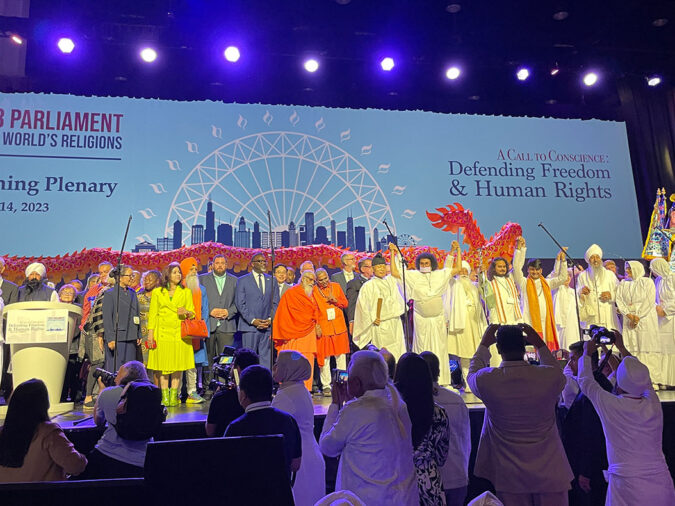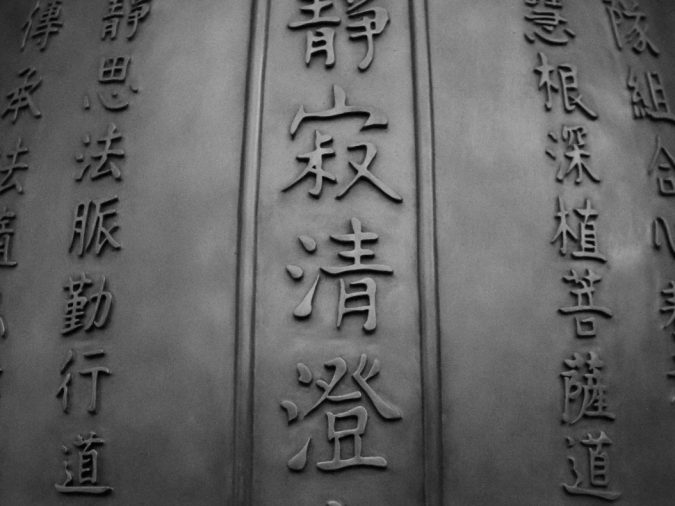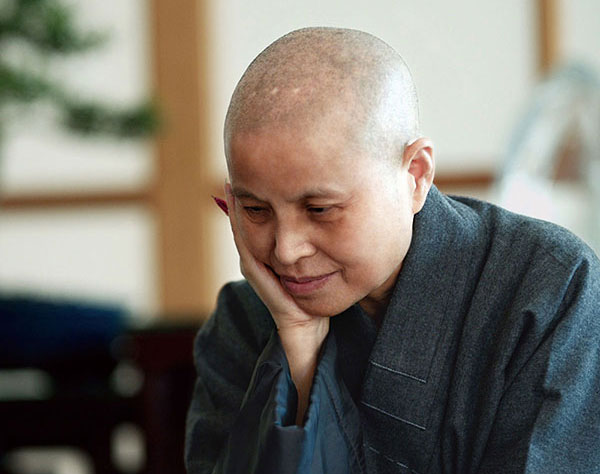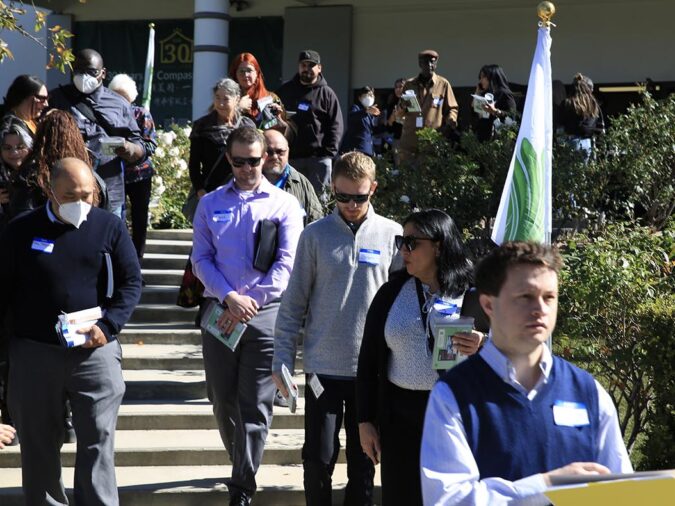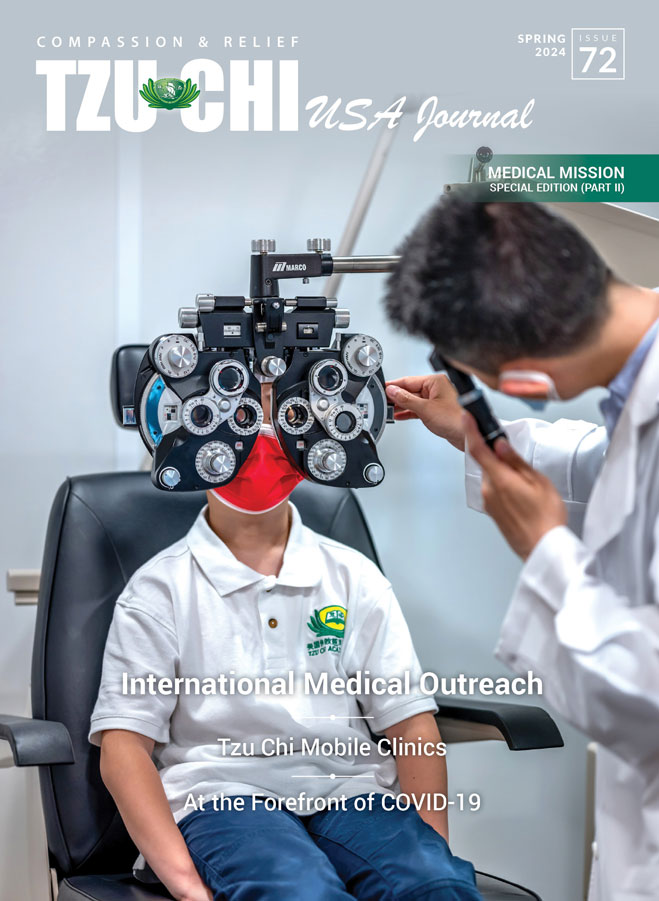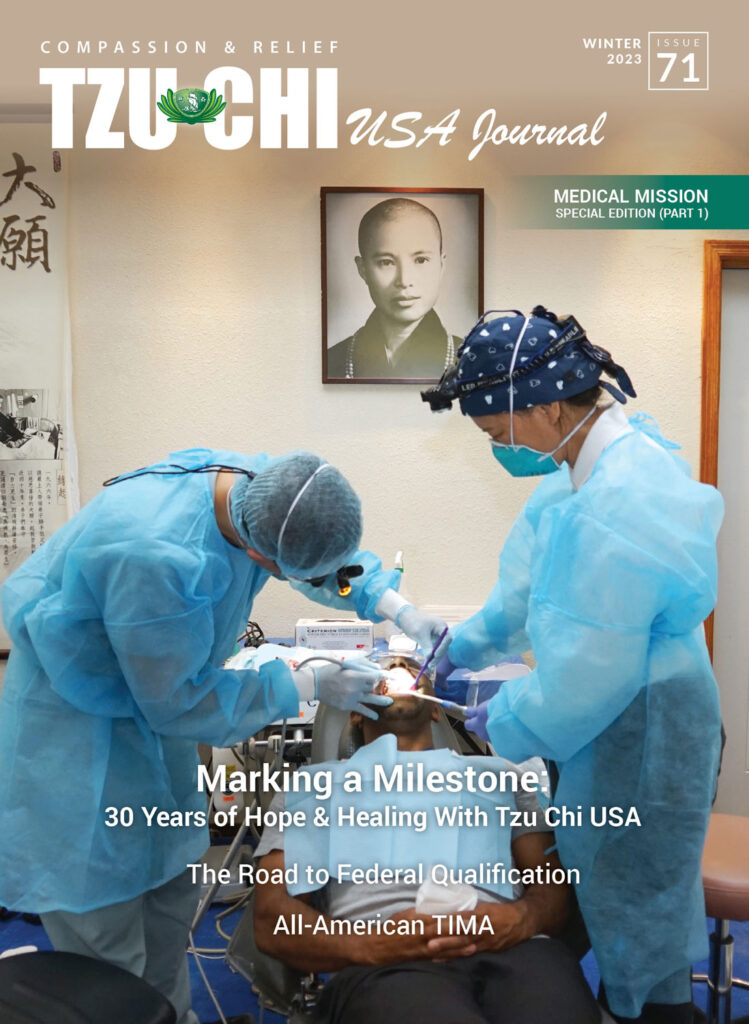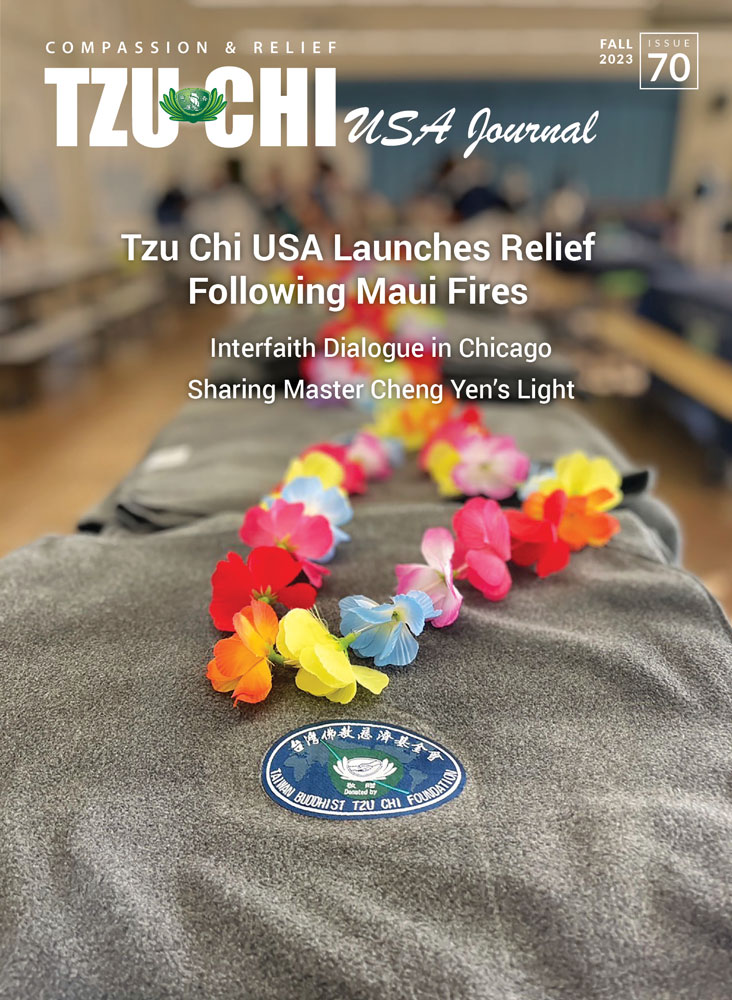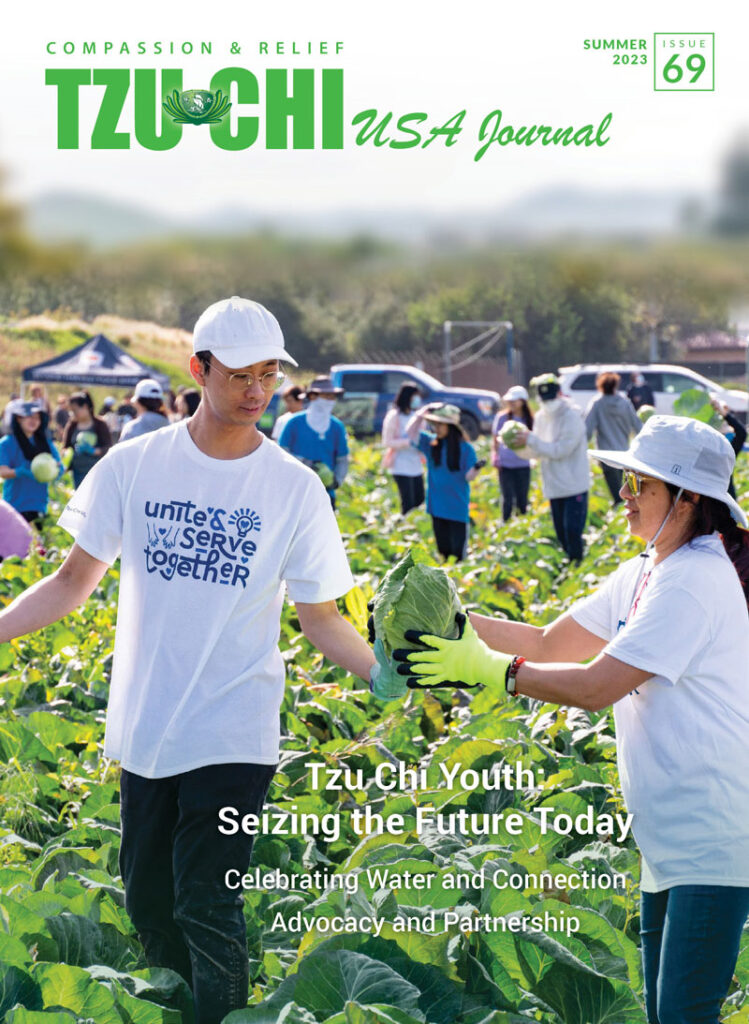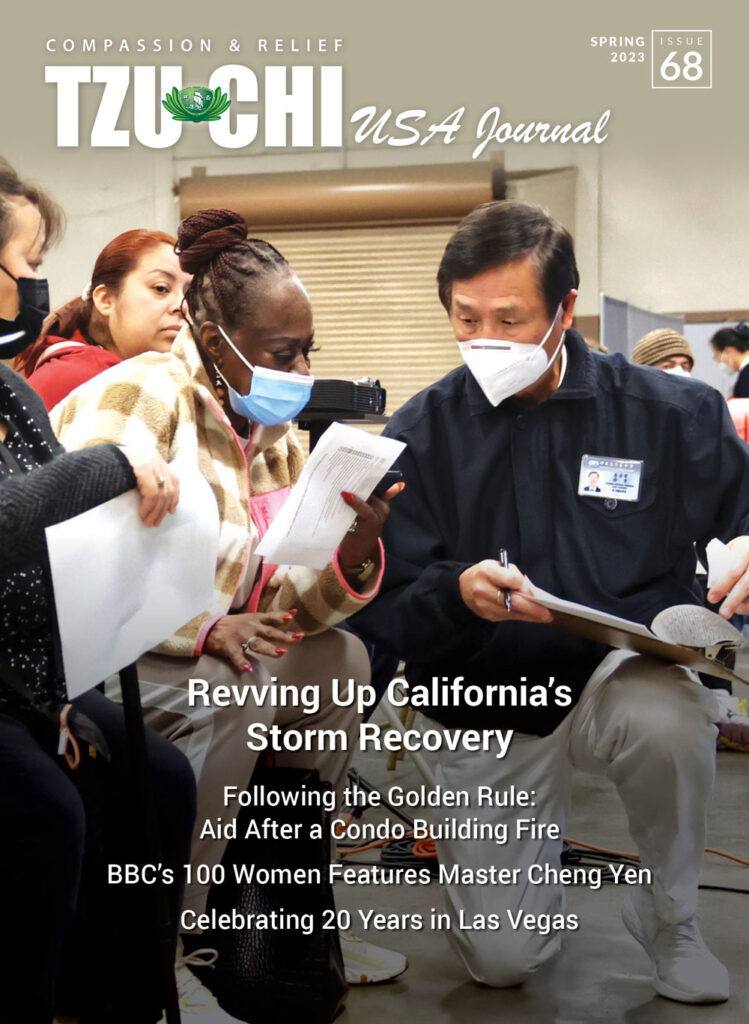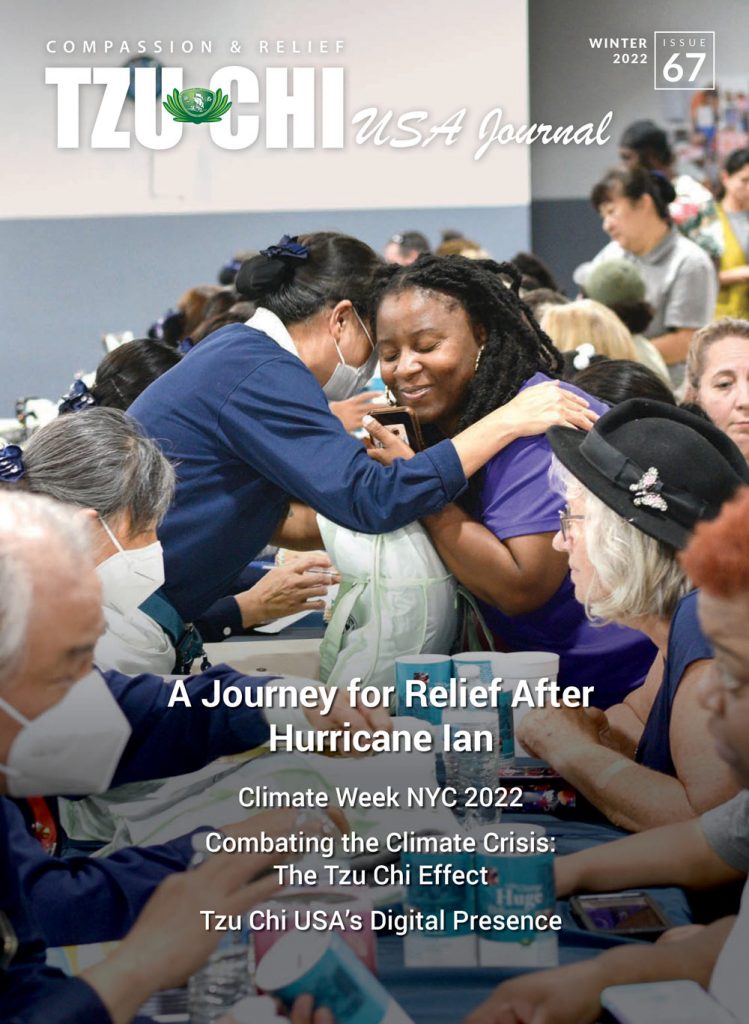Tzu Chi USA Chief Executive Officer and Global Partnership Affairs Department member Debra Boudreaux shares the meaning of Tzu Chi’s “Great Love” pendant with attendees of the 62nd United Nations Women’s Assembly in New York in 2018, explaining that love knows no nationality or language. Photo/Tzu Chi USA Media Team
Written by Ida Eva Zielinska
Published #69 | Summer 2023 Issue
SHARE
While Tzu Chi volunteers are at the forefront of Tzu Chi’s global missions, providing charity and disaster relief assistance, offering educational and medical care services, and more, another team is working behind the scenes: The Global Partnership Affairs Department, or GPAD, in short.
Tzu Chi officially created GPAD two years ago. However, its roots and activities go back to 2003: Recognizing the importance of engaging with the international community, Tzu Chi became a member of the United Nations Department of Public Information (UN DPI), now the United Nations Department of Global Communications (UN DGC).
Tzu Chi USA Chief Executive Officer Debra Boudreaux recounts that the global affairs group was known as the UN Task Force at that time: “From this core team, we got ourselves through the door.” When Tzu Chi formed GPAD, she remained, although without a specific title, “It’s just support, participation, engagement, facilitating.”
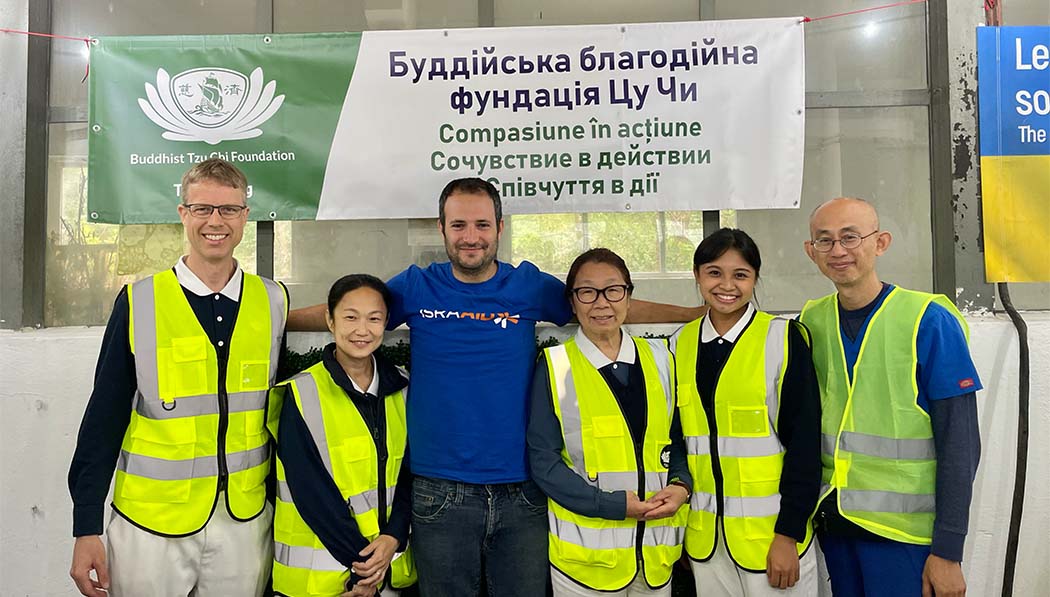
The whole concept of the Global Partnership Affairs Department is to bring Tzu Chi’s horizons to the global level. The global level tells us to ‘think big, but focus on grassroots efforts.’ From the grassroots, you find your partners, then work from the regional to national, and then to international, to global.
Debra Boudreaux
Chief Executive Officer
Tzu Chi USA
GPAD’s work is critical in introducing Tzu Chi’s spirit of compassion in action and one global family approach to aid while seeking, forging, and maintaining international partnerships and collaborations toward joint humanitarian missions.
Overall, the role of global partnership for [Buddhist] Tzu Chi Foundation is to foster greater cooperation and collaboration across borders and cultures in order to create a more compassionate and just world for all.
Branda Ng
Manager
Global Partnership Affairs Department
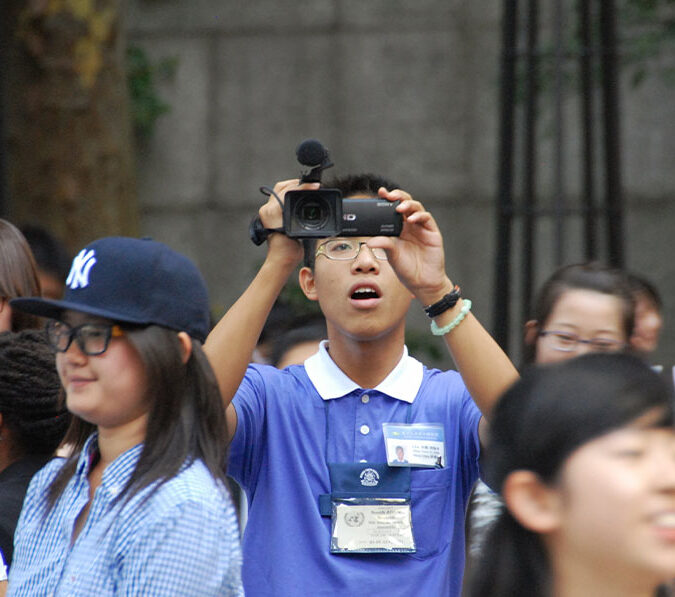
When organizations that have never met Tzu Chi before learn of our approach to our work and aid, the most common response we receive as a team is remarks around how holistic and all-encompassing Tzu Chi’s interventions are.
Steve Chiu
Program Director
Global Partnership Affairs Department
From GPAD team members’ perspectives, let’s explore what GPAD does and why it’s essential for Tzu Chi, whose aid footprints have already reached 128 countries and regions. The voices contributing to this narrative are all Tzu Chi veterans – beginning with Tzu Chi USA CEO Debra Boudreaux, who joined the world of Tzu Chi over 30 years ago in 1989 as a media volunteer, then began volunteer training in 1991.
Johan Alwall, a specialist on the team, became part of Tzu Chi as a volunteer in 2008, serving full-time by 2013, then assuming roles involving English language needs within the organization. Ashley Yong, a youth representative and project manager, joined as a Tzu Chi Youth Group member in 2010. Read about Ashley’s Tzu Chi Journey.
Branda Ng joined Tzu Chi in 2003 as a Collegiate Association member in Singapore; after roles in medical missions and Tzu Chi Global Headquarters offices in Taiwan, she is now a GPAD manager. For Steve Chiu, a GPAD program director, his first memories of Tzu Chi date back to 1999 when he was just a seven-year-old child, and he proudly declares, “Tzu Chi has consistently been a part of my life ever since.”
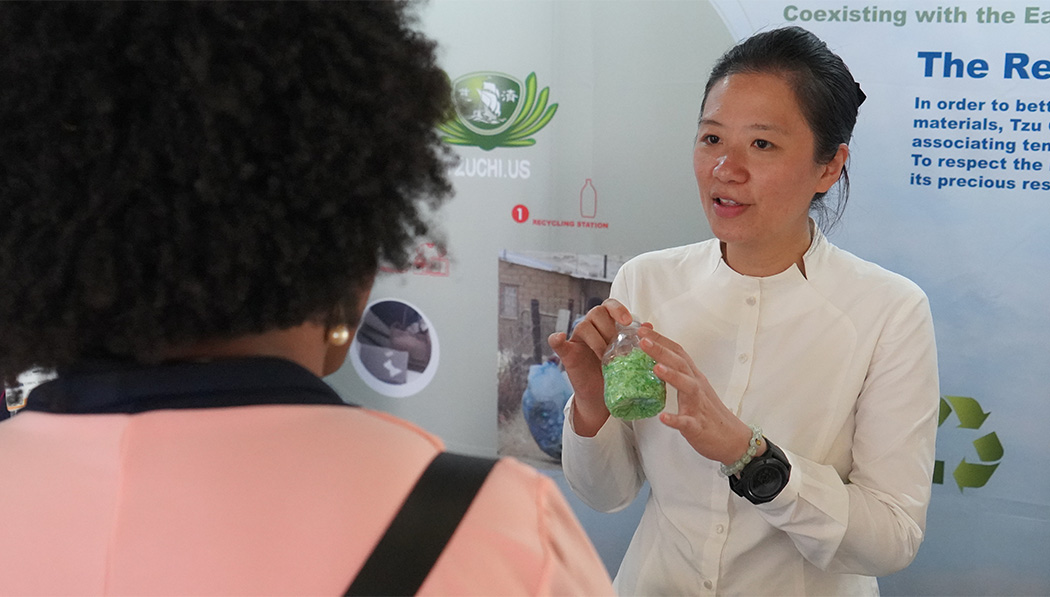
Presence Within the United Nations System
The Buddhist Tzu Chi Foundation (BTCF) has officially been an NGO in Special Consultative Status with the United Nations Economic and Social Council (UN ECOSOC) since July 19, 2010. “Obtaining special consultative status with ECOSOC was the culmination of almost ten years of efforts from Tzu Chi volunteers to participate in, share at, and engage with various United Nations Conferences,” Steve Chiu says, adding:
Having special consultative status and engaging with the UN ensures that the international community recognizes and understands Tzu Chi’s best practices and know-how. BTCF can advocate for practices and policies that align with the values and actions of Tzu Chi volunteers from around the world, helping shape the consciousness of members of ECOSOC while being in community with like-minded civil society organizations that seek to amplify the impact being made on both the global and local level.
Sharing Tzu Chi’s perspective, which embodies founder Dharma Master Cheng Yen’s views and Buddhist wisdom, is vital for the GPAD team.
What motivates me every day coming to work is the opportunity to share and spread Master’s philosophy and Tzu Chi’s methods of empowerment. By ourselves, no matter how big we grow, Tzu Chi can only reach a small number of people in suffering, but if we can spread our philosophy and principles, we can make a greater impact on the world.
Johan Alwall
Specialist
Global Partnership Affairs Department
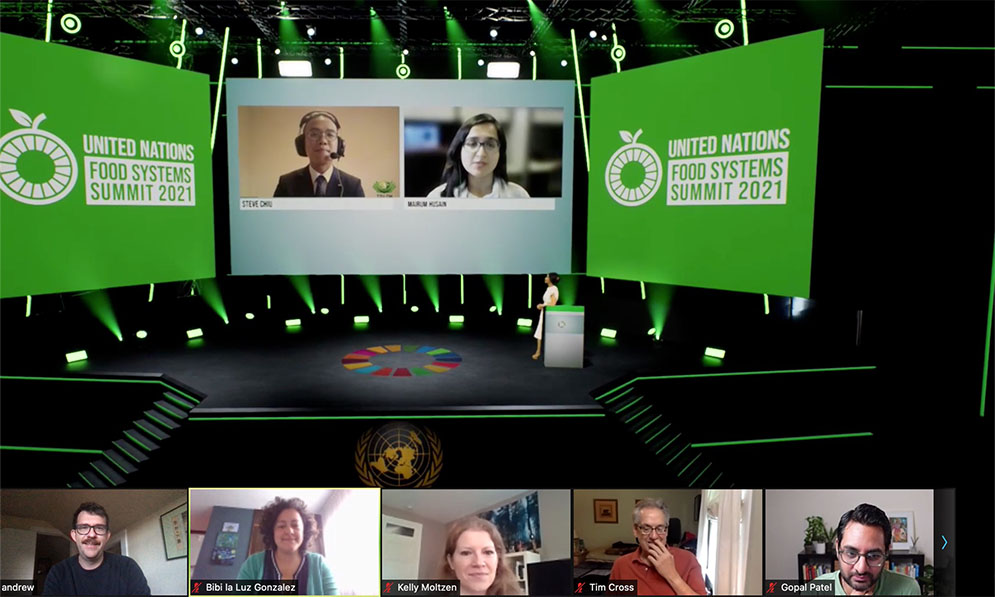
With this at heart, “Over the past 20 years, Tzu Chi has worked hard to engage with the United Nations and seek accreditation with various UN agencies whose work aligns deeply with Tzu Chi’s missions and footprints,” Steve tells us. Debra Boudreaux points out that UN DPI (now UN DGC) membership was “just the entry level for us. And then from Tzu Chi’s four major missions [Charity, Medicine, Education, Humanistic Culture], we slowly expanded each within the UN family’s structures.”
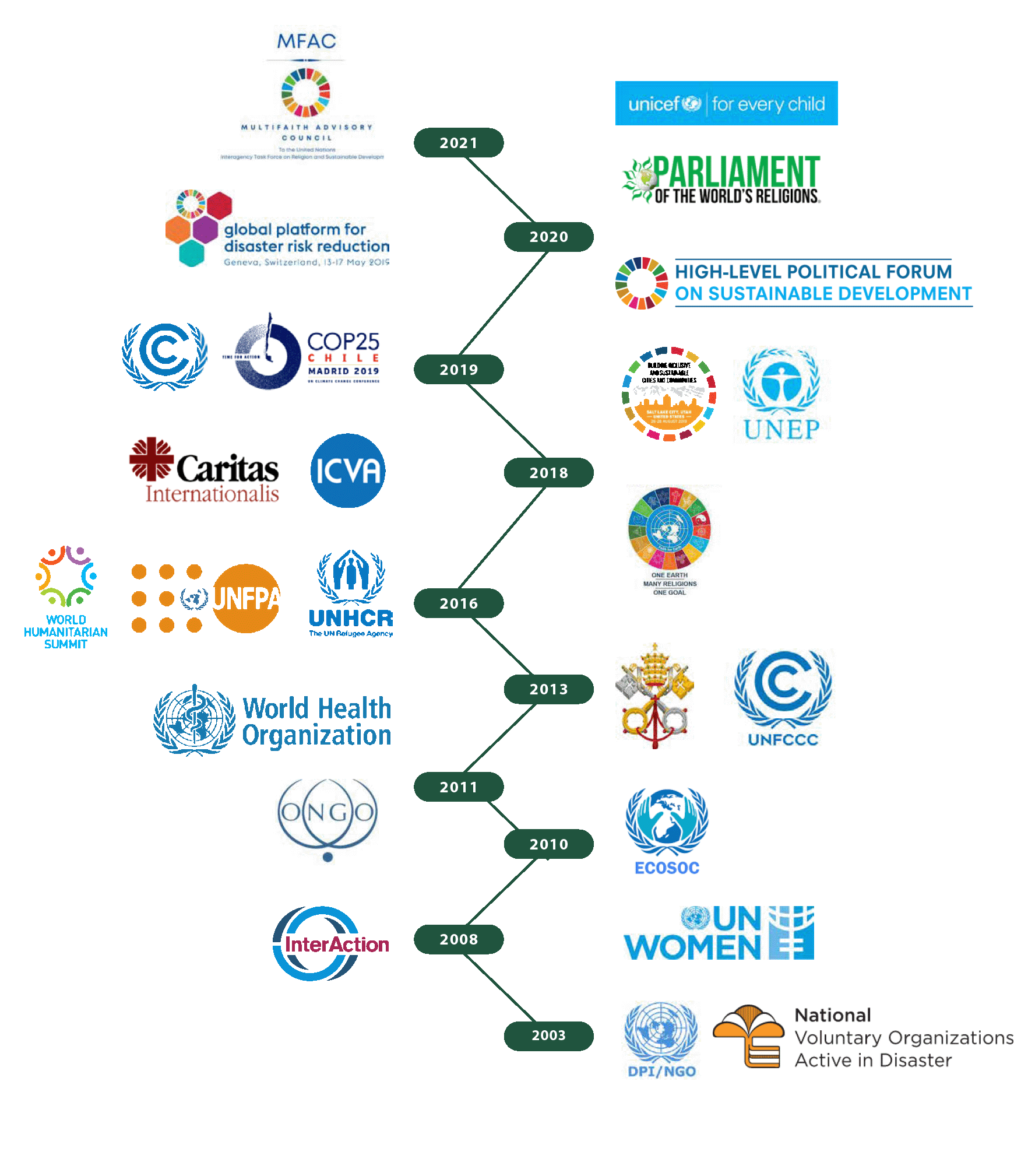
“The result of these efforts is building a tremendous network of organizations, partners, and agencies that deeply understand and appreciate Tzu Chi’s perspectives on sustainable development, humanitarian assistance, and the empowerment of the most vulnerable,” Steve confirms. Moreover, “The GPAD team is constantly exploring new ways to utilize this network to strengthen Tzu Chi’s advocacy at the international level and help Tzu Chi volunteers deepen their impact at the ground level.”
Currently, BTCF participates in the activities of UN Women, the UN Refugee Agency, UNICEF, and UN Youth affairs. In 2019, the United Nations Environment Programme (UNEP) affirmed BTCF as a Non-Governmental Organization Observer entitled to submit written suggestions or publish related plans.
Engagement, participation, and that’s step one. From there, we’re moving into a stakeholder position. From the stakeholder position, we can have the capacity to make a statement, to present initiatives, to share about Master Cheng Yen’s legacy, and also to promote Buddhism in action.
Debra Boudreaux
Chief Executive Officer
Tzu Chi USA
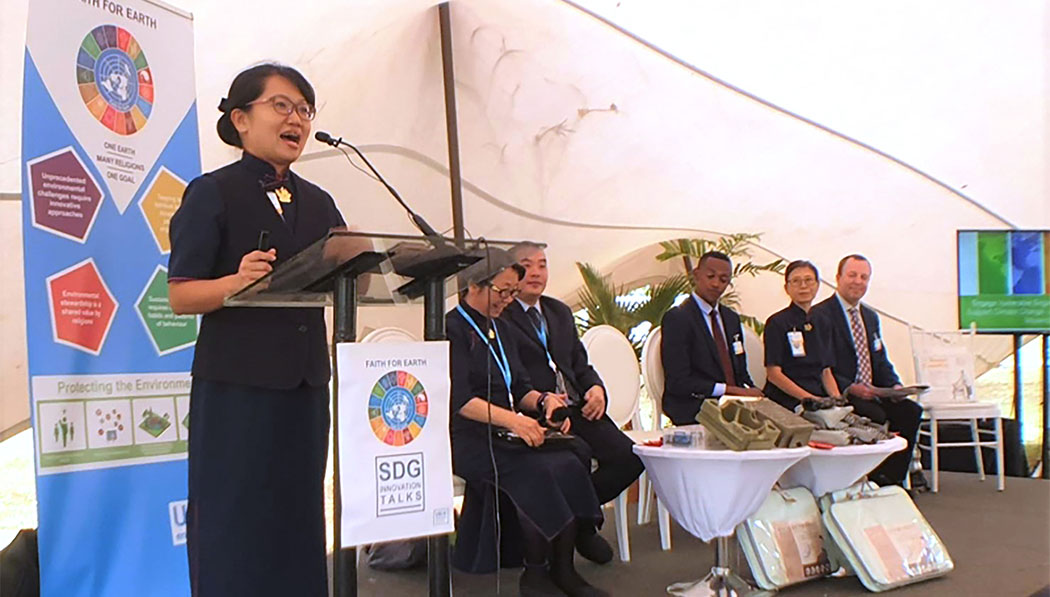
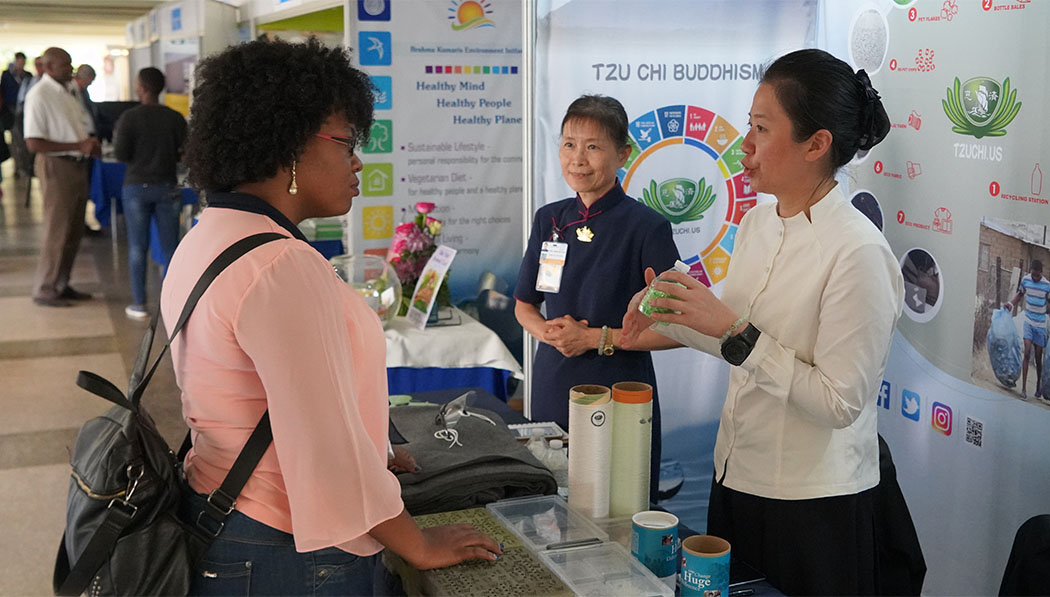
Most recently, the United Nations Interagency Task Force on Religion and Sustainable Development (UN IATF-R) appointed BTCF as one of the four Co-Chairs of the Multi-Faith Advisory Council to serve a two-year term starting in 2022. Boudreaux explains more:
All faiths have the same language: Love. It’s just how to carry out this love across communities of different faiths that we work through. As a co-chair, we have more capacity to share with them, to share the Buddhist perspective, and we have more capacity to invite them and convene meetings at the Tzu Chi Center for discussion. So, it’s a stakeholder position, and we have more capacity to let people be aware of Buddhists in action.
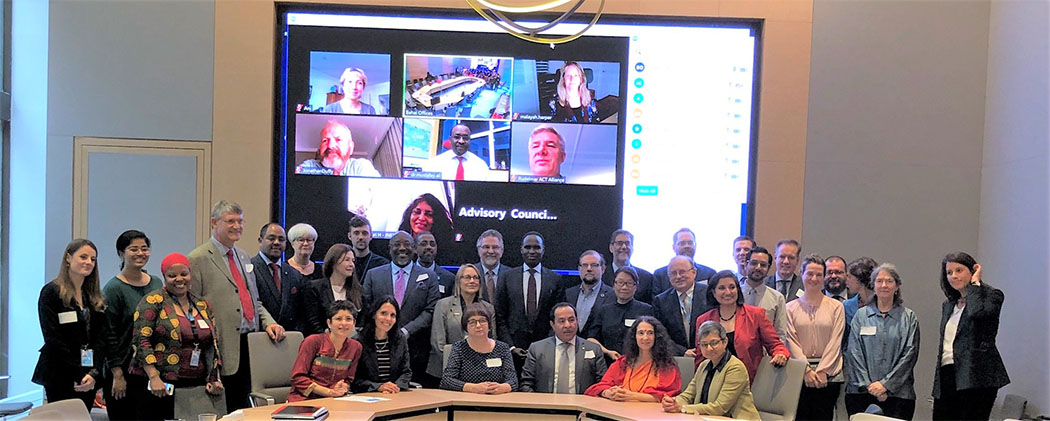
Advocacy for the UN Sustainable Development Goals
Another way GPAD (and Tzu Chi overall) engages with the United Nations and aspects of its agenda is through diligent work toward and advocacy for the Sustainable Development Goals (SDGs) adopted by all United Nations Member States in 2015 in the hopes of reaching them as a global community by 2030. The SDGs provide “a shared blueprint for peace and prosperity for people and the planet, now and into the future.”
Working across all four missions and eight footprints [including International Relief, Environmental Protection, Bone Marrow Donor Registry, and Volunteerism], we find that Tzu Chi’s work deeply intersects with the United Nations 17 Sustainable Development Goals (SDGs) and truly is representative of the cross-cutting and holistic approach that the SDGs aspire to have.
Steve Chiu
Program Director
Global Partnership Affairs Department
As Branda Ng explained, Tzu Chi, a Faith-based Organization, is committed to several of the 17 SDGs through its work in charity to provide basic needs and economic empowerment; hunger and malnutrition relief; health care initiatives, medical outreach, encouragement of healthy lifestyles and disease prevention; educational support for disadvantaged children and adults, plus character education programs; promotion of environmentally sustainable and plant-based diets, recycling, and avoidance of single-use plastic products; support for peace through spiritual guidance, and; creation of partnerships in all regards.
Ashley Yong shares that Tzu Chi is committed to the SDGs even internally, and to support that, will consistently “Provide comprehensive Education for Sustainable Development (ESD) to Tzu Chi volunteers through workshops; Interlink Tzu Chi community programs to SDGs using SDGs terminologies and knowledge, and; Use SDGs in the media/design for events and activities.” She also points out GPAD’s efforts to align with the SDGs and its targets by assembling gender-balanced panels, ensuring zero-waste events, etc.
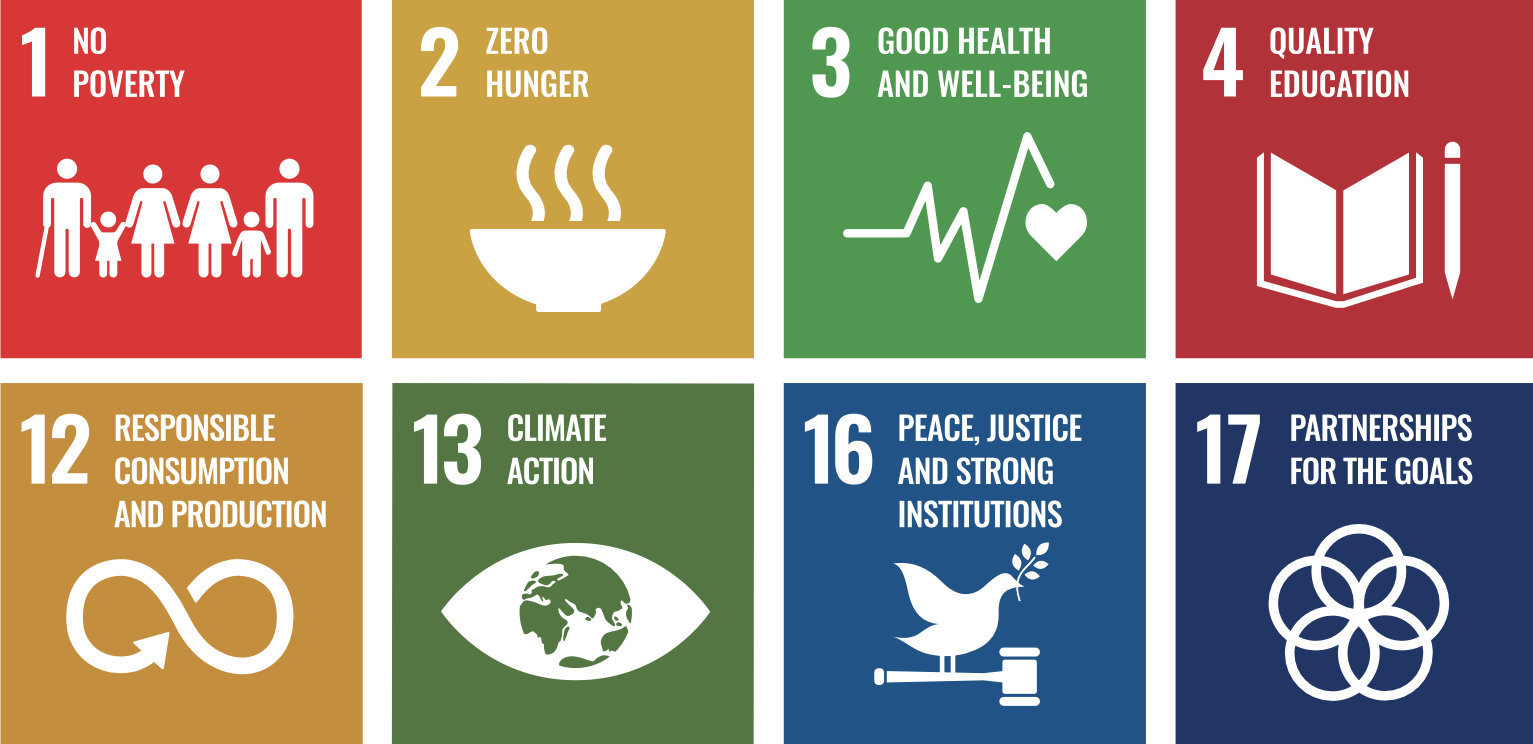
Partnerships and Empowerment
Among the UN’s 17 SDGs, the last is Partnerships for the Goals, and seeking and forging these is central to GPAD’s role within Tzu Chi.
By forming partnerships, Tzu Chi can increase the impact of its relief efforts, share resources and expertise, promote interfaith and intercultural understanding, and build a network of support that can be leveraged during future crises.
Branda Ng
Manager
Global Partnership Affairs Department
Forming global partnerships during international emergencies is especially important, as it was in 2022 after the war between Russia and Ukraine erupted and created a Ukrainian refugee crisis. Thanks to GPAD’s efforts, Tzu Chi secured a Memorandum of Understanding with several organizations serving displaced Ukrainians, including UNICEF, Camillian Disaster Service International Foundation (CADIS), IsraAID, Polish Women Can Foundation, Airlink, ADRA International, Project HOPE, and World Hope International.
Although, crises are not the only context where partnerships are essential:
There are many parts of the world where there are no Tzu Chi volunteers, but great local needs, whether due to natural or man-made disasters or as a result of long-term marginalization and poverty. In these situations, finding local or international partner organizations is often the only way to respond to the suffering encountered by the people.
Johan Alwall
Specialist
Global Partnership Affairs Department
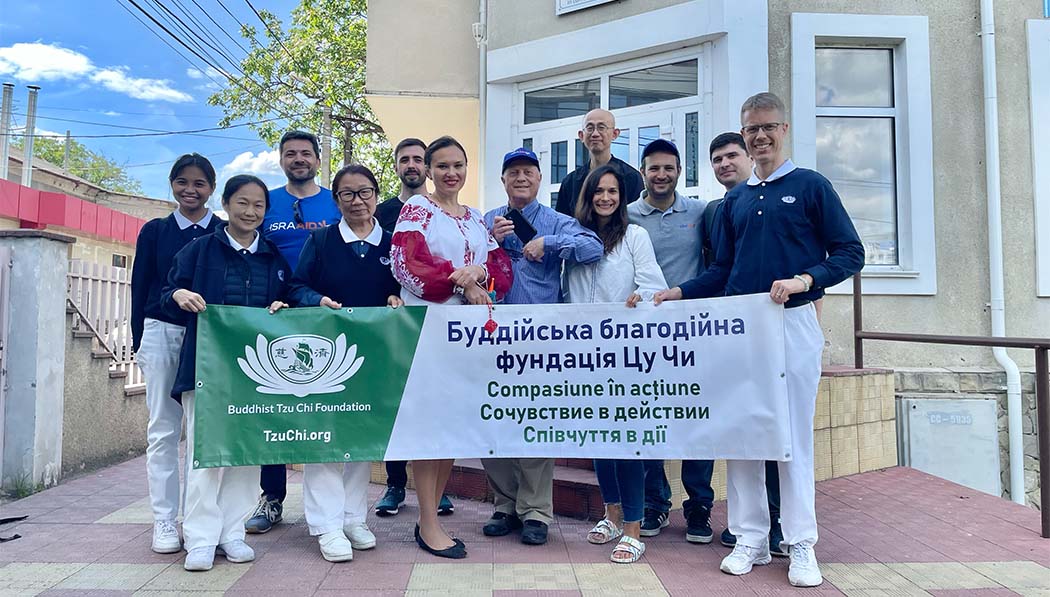
Johan Alwall identified the long-term effects of sharing Tzu Chi’s values and methodology (which inspire both partners and assisted communities and lead to enhanced mutual care and self-reliance) by citing the example of Sierra Leone, where “a strong local community volunteer culture has grown since Tzu Chi started working with local partners. Now, whenever there is an emergency or calamity in a community, volunteers quickly gather to assess the situation and assist the residents.”
Empowerment is equally prominent within GPAD’s goals. Concerning partnerships, it’s a two-way flow benefiting Tzu Chi’s missions and its partners’ aims and activities. Johan elaborates:
We always pay close attention to our partners’ suggestions while providing expertise and guidance to maximize the effects of the collaborations. In particular, working with local partner organizations in locations where we’re unable to routinely go ourselves (whether due to the security situation or simply to distance and travel expenses), we listen closely to their assessments of the situation and their suggestions for solutions. Based on available resources, we then work with the local partners to adjust the proposals until an optimal outcome can be reached.
Concurrently, GPAD collaborates with the international community to promote grassroots empowerment. “In our project assessments, we particularly value projects that help local communities develop resilience and sustainability in the face of the challenges they encounter,” Johan says.
Ashley Yong pinpoints that GPAD also empowers young people, women, and members of marginalized groups within the scope of its activities, giving them a voice on the global stage by providing speaking opportunities, a chance to attend or participate in the planning stages of meetings and events, and so on.
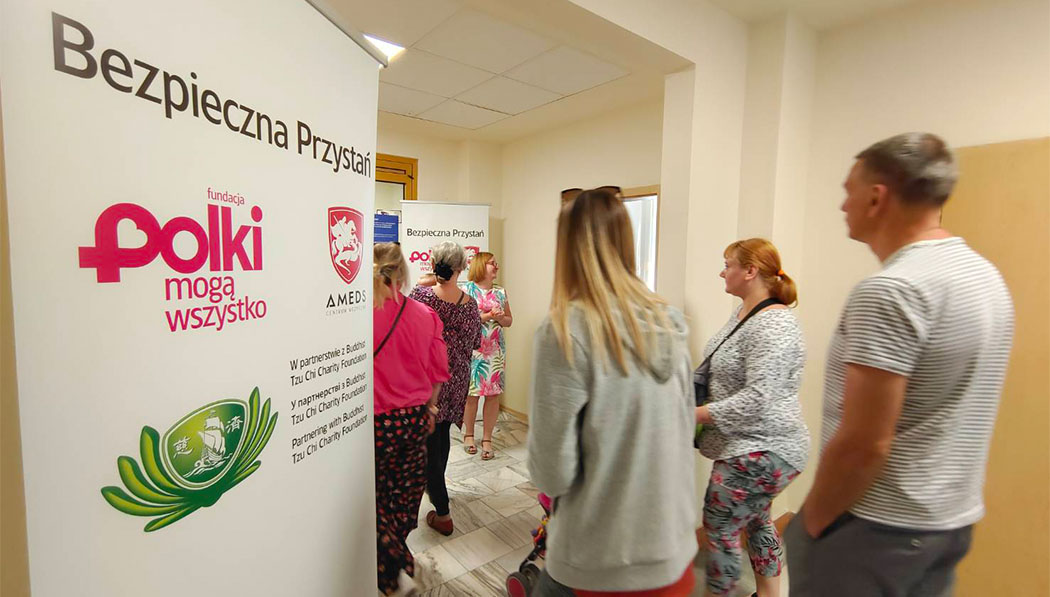
In June 2023, Tzu Chi and the Polish Women Can Foundation cement plans for the Safe Haven cooperation project, leading to a center opening on June 29 and providing Polish and English language courses, psychological counseling, legal consultation, and more for Ukrainian refugees. Photo/ Tzu Chi USA Media Team
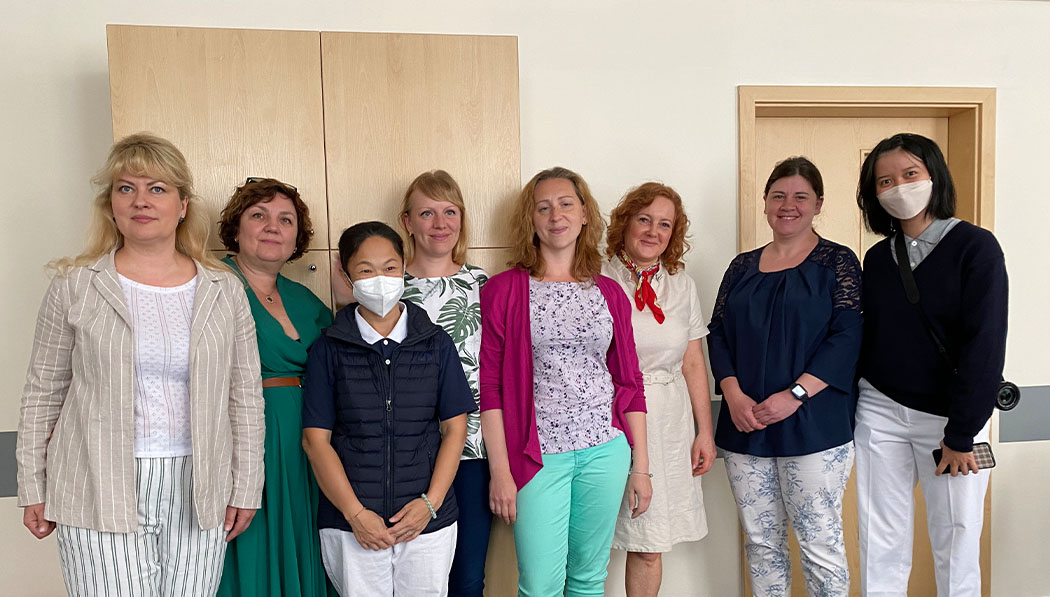
Embracing New Opportunities
“Some of the latest milestones in GPAD’s history haven’t been new UN entities that Tzu Chi has become accredited to, as we already have our hands quite full working with our existing UN partners,” Steve Chiu announced. Coinciding with Climate Week NYC, GPAD’s September 2022 Holistic Climate Solutions Summit – a seven-day, 22-event summit that was co-organized with 25 partner organizations and centered around existing holistic approaches and models that can tackle our climate crisis – was a first for the team.
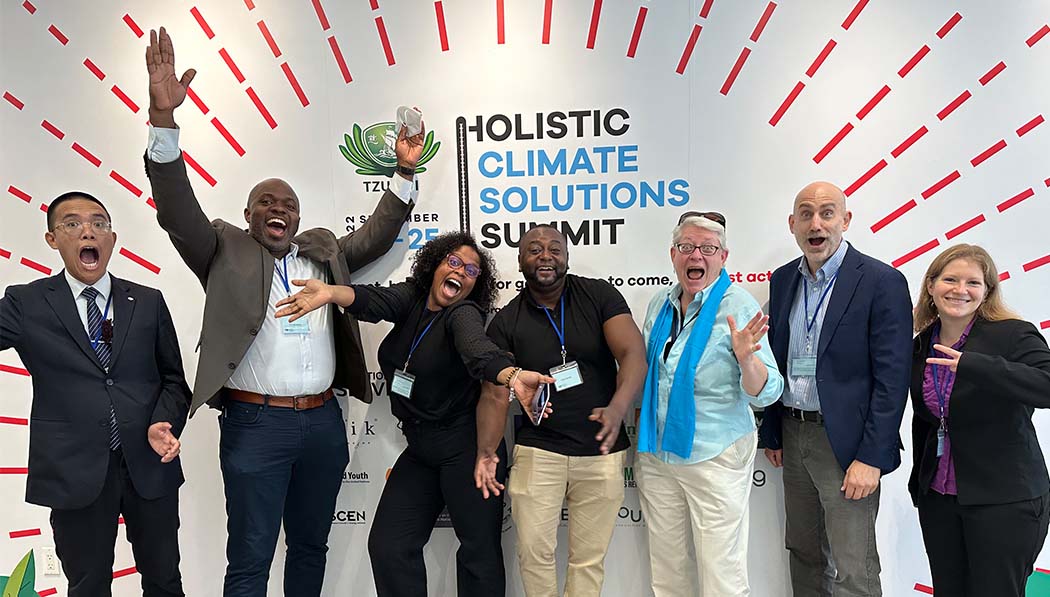
In 2023, partnerships emerged at the forefront of humanitarian support for those impacted by two successive earthquakes that struck Türkiye near the border with Syria on February 6. First, that same month, to immediately ensure earthquake survivors could receive hot food, Tzu Chi partnered with the nonprofit organization World Central Kitchen, which provides emergency food relief, serving fresh meals to disaster survivors.
In March, Tzu Chi formalized a collaboration with Dünya Doktorları Derneği, the Türkiye arm of the Doctors of the World International Network, comprising 17 national chapters that work together in 80 countries serving the most vulnerable people in need of health care. In fact, Tzu Chi has worked with Doctors of the World International before.
As Po-Wen Yen, Chief Executive Officer of the Buddhist Tzu Chi Charity Foundation stated during the signing ceremony, Tzu Chi has worked with Doctors of the World since 1993, and this latest joint venture will combine expertise, resources, and efforts to make a meaningful difference in the lives of the survivors.
Our collaboration will work towards providing physical and mental health support to those who have been traumatized by the earthquake.
Po-Wen Yen
Chief Executive Officer
Buddhist Tzu Chi Charity Foundation (HQ)
Fraser Mooney, Executive Director at Doctors of the World USA, who represented the Doctors of the World International Network during the ceremony, highlighted the significance of this alliance:
Although the media spotlight has largely moved on to other subjects, the effects being felt in the region have not ended. It will take years for these communities to repair and heal and that is why this year-long partnership with the Tzu Chi Foundation is so important.
Fraser Mooney
Executive Director
Doctors of the World USA
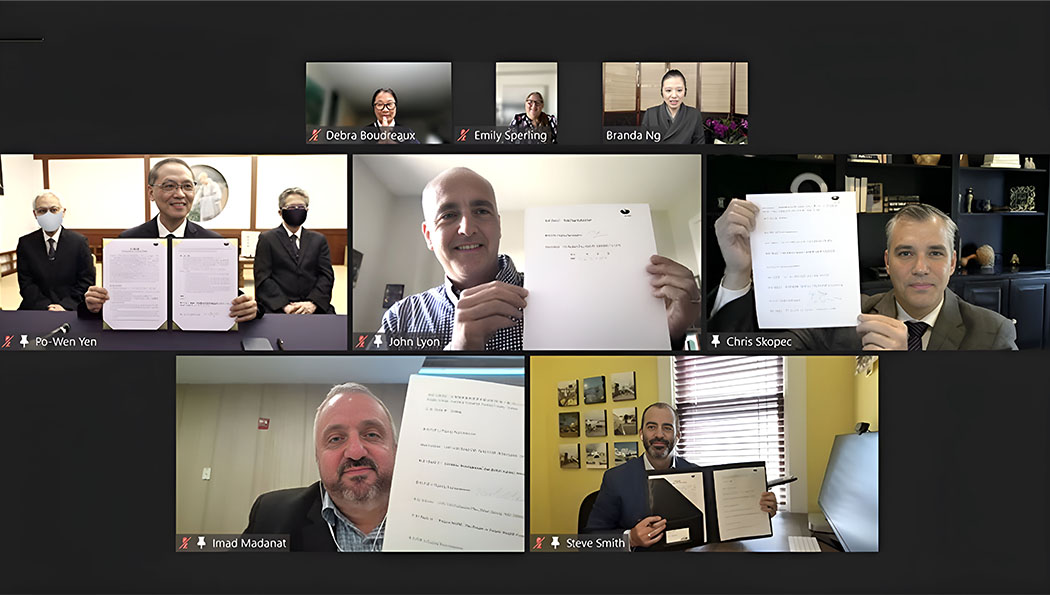
Tzu Chi’s Voice Matters
Whether in forging partnerships, SDGs advocacy, or a presence on the international stage, the GPAD team, BTCF, and every Tzu Chi volunteer collectively agree that Tzu Chi’s unique voice matters and should be heard. And that voice leads back to Tzu Chi’s founder, Dharma Master Cheng Yen.
Throughout her life, Dharma Master Cheng Yen has shared many insights about the world and human nature based on her Buddhist teachings and personal experiences. She stresses the importance of serving others and positively impacting the world. Voicing is also important for Tzu Chi because it can help challenge the stigma and stereotypes often associated with poverty. When people living in poverty can share their stories and experiences, they can help to humanize the issue and show that poverty is not a personal failing, but a structural problem that requires systemic change.
Branda Ng
Manager
Global Partnership Affairs Department
The power of Tzu Chi’s advocacy and message is found within the understanding that if we are to create a better future for all, we cannot simply address the material lack/needs of those who are suffering. That is not enough. We must also work to unpack root causes and shift our societies away from the pursuit of materialistic progress at the expense of our planet’s wellbeing. This in turn is why Tzu Chi’s voice matters: We provide an alternative narrative to our commonly held notions of progress, and model what a good life truly looks like – a life of empowerment, service, and interconnectedness with the natural world.
Steve Chiu
Program Director
Global Partnership Affairs Department

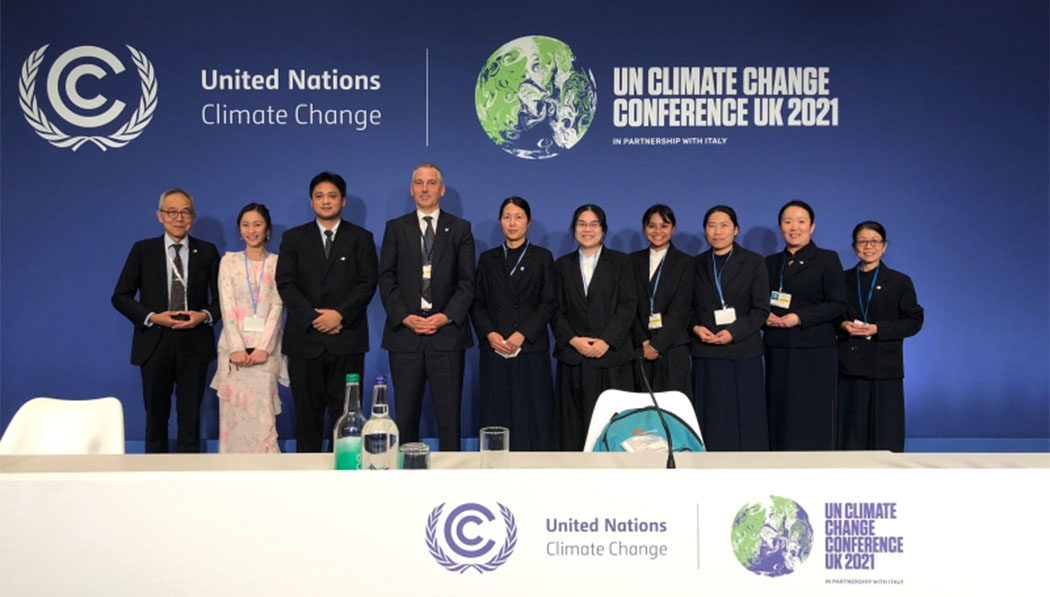
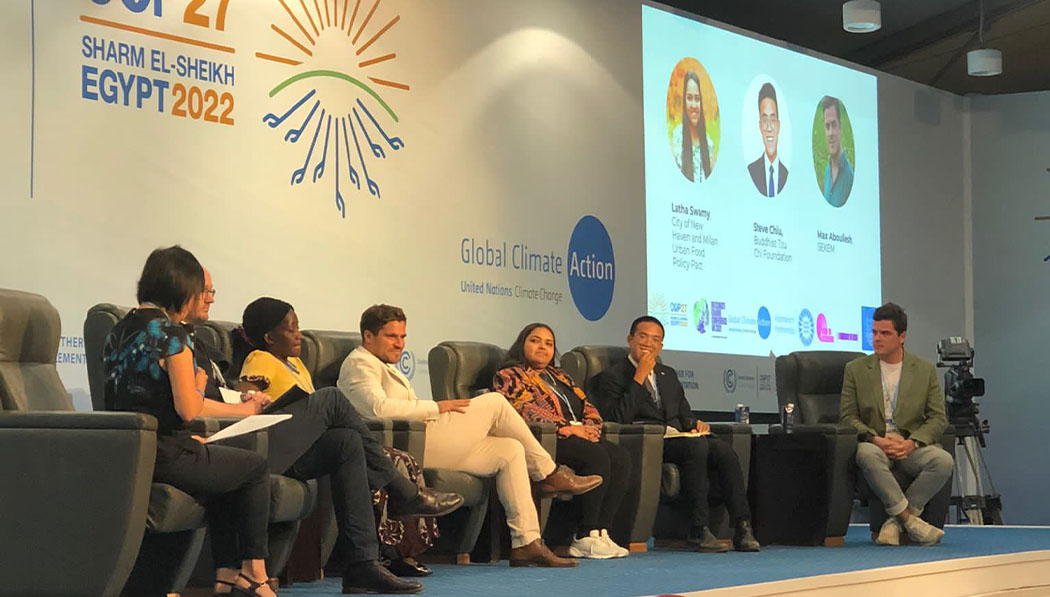
We can see that the GPAD team has created engagement, participation, and a stakeholder position. As Tzu Chi USA CEO and GPAD team member Debra Boudreaux highlights, that’s just the beginning:
From there, we can move to a higher level, to build up Buddhist teachings into the road map of the UN’s various programs, various work streams, and from those teachings, it’s how to engage the policymakers.
Debra Boudreaux
Chief Executive Officer
Tzu Chi USA
